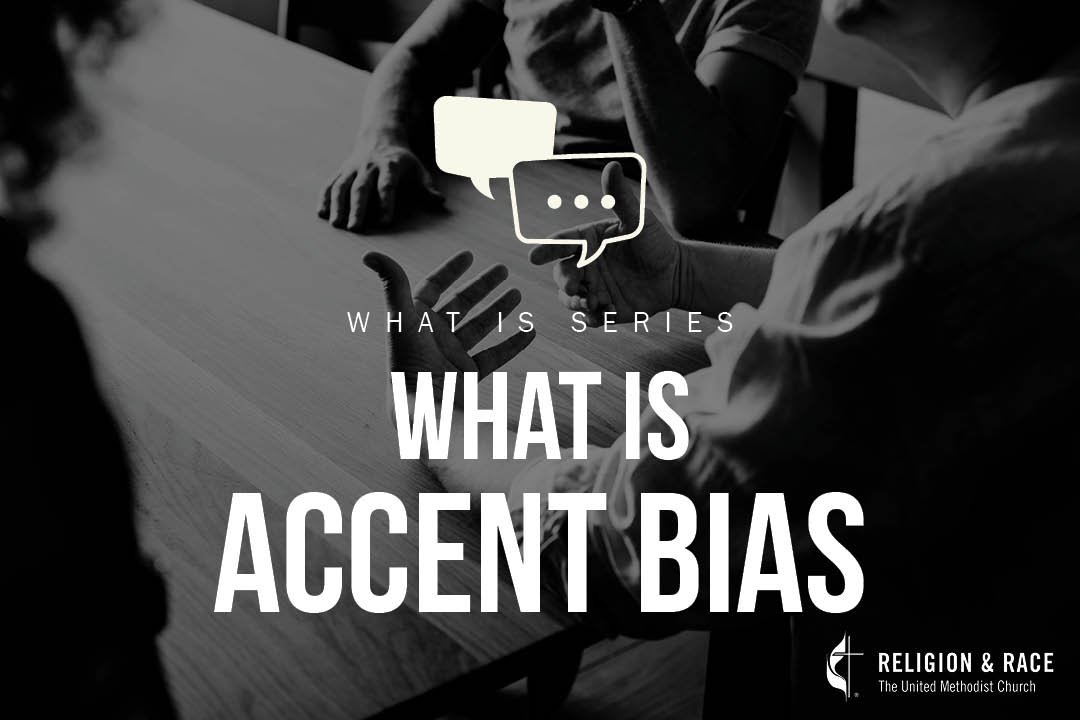What Is Accent Bias?
As humanity’s understanding and discussion of the concepts of race, racism, and antiracism have evolved over generations, so have the words and phrases we use as we continue the work of obeying God and advancing racial justice.
In this “What Is?” series, the General Commission on Religion and Race offers this compilation of concise definitions, examples, and Biblical/theological foundations to create common vocabulary for Christians as we engage in anti-racism work.
Our hope, as you engage this series, is that the learning equips you to move into deeper waters in anti-racism work in your respective context.
Visit the series homepage for more information on other anti-racism resources.
Definition:
Accent bias may be defined as an unwarranted and unjustifiable prejudice toward individuals and communities who speak a language with an accent different from the dominant culture.
Example(s) of Accent Bias:
Accent is often used as a marker of difference, which oftentimes lead to discriminatory treatment. This accentual marker of difference often intertwines with one’s skin color and national origin. It has been observed that people are frequently categorized into a specific social class and treated with prejudice based on their accents and routinely deemed as not intelligent and capable. Accent bias is nothing new and can create unjust discrimination, even violent acts, for people whose sound of their speech is different.
Born in Malaysia, I grew up as multilingual person. I can communicate in four Chinese languages/dialects—Hinghwa, Hokkien, Cantonese, and Mandarin—English, and Malay. I admit that I do not speak any of the languages perfectly and with the right accent of native speakers. Even as a Hinghwa, my accent is different from the native speakers back in Putian, China. When I was in graduate school working on my Ph.D., at one point, the international student advisor recommended for me to get evaluated for my speech and accent. The assessment of the evaluator was that I have a “thick” foreign accent and suggested that I see a speech therapist to correct my accent so that I can be successful in my career. There is already an implicit bias that accent outweighs my intellect and ability to succeed in my career. The obvious presumption is that a language needs to be spoken in a particular accent that is correct and acceptable.
- From author Dr. Kah-Jin Jeffrey Kuan, Ph.D., President of Claremont School of Theology
Biblical/Spiritual/Theological Framing or References:
There are two passages in the Bible that relate to language accents. The first is in the Old Testament in the story of intertribal conflict between the Gileadites and the Ephraimites in Judges 12:1–6. Feeling snubbed for not being invited to participate in the battle against the Ammonites, the Ephraimites crossed the Jordan to confront the Gileadites but were defeated. When Ephraimite fugitives tried to escape and cross the Jordan, they were subjected to a linguistic test to ascertain their tribal identity. Saying the word “Sibboleth,” because of their regional accent, instead of “Shibboleth,” led to their being slaughtered. In this story, accent bias has fatal consequences.
The second is in the New Testament, in the story of Peter’s denial in Matthew 26:69–75. As the story goes, Jesus had been arrested and Peter followed in a distance. When Peter was in the courtyard of the high priest, a female servant recognized him as someone who was with Jesus the Galilean, but he denied it. It happened the second time; and the third time, bystanders identified him saying, “Certainly you are also one of them, for your accent betrays you.” This is likely a reference to a distinctive northern Galilean accent of the Aramaic language spoken at the time of Jesus. Peter’s accent outed him and threatened his safety.
While these are disturbing examples of accent bias in the Bible, we are encouraged as followers of Jesus to move beyond differences. Paul says in Galatians 3:28: “There is no longer Jew or Greek; there is no longer slave or free; there is no longer male and female, for all of you are one in Christ Jesus.” There should be no bias or discrimination of anyone because of differences, including accent, for we are all one in Christ Jesus. This is the ethic of compassion, justice, and belonging that Paul advocates for all followers of Jesus Christ.
Reflection Questions:
A living language is dynamic and not static; it changes with people group and context. Do we presume that there is a “preferred” accent over others?
In a worldwide context marked by migration, mobility, and diversity, why do we put the onus on people to speak with the “correct” accent? What happens if listeners begin to cultivate the ability to listen to the multiplicity of accents?
What role can communities of faith play in moving our societies beyond accent bias? What impact would that have on our denomination?

